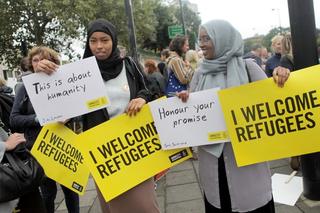Collective letter regarding the Immigration (Mass Arrivals) Amendment Bill

Collective letter in response to the Immigration (Mass Arrivals) Bill
15 May 2024
Tēnā koe Minister Stanford and Associate Minister Costello,
We are writing as a group representing the forced migration sector, including many with lived experience as refugees, ahead of the Committee Stage of the Immigration (Mass Arrivals) Amendment Bill.
While many of us made submissions to the select committee in 2023, we wanted to write ahead of the Committee Stage in order to:
- Express our support for the four additional safeguards put forward as amendments in the Cabinet Paper published 6 November 2023
- Express our support for a small number of additional amendments
- Note our desire to see more engagement from the Mass Arrivals Team in MBIE with both the forced migration sector and with people with learned and lived experience of immigration detention.
We understand that with the current level of government support, the Immigration (Mass Arrivals) Amendment Bill will likely pass. Our submission here is made in the spirit of trying to alleviate any humanitarian concerns around the Bill and to ensure the inclusion of additional critical safeguards and clarifications.
As with the submission from the United Nations High Commissioner for Refugees (UNHCR), we assert that the detention of asylum seekers is inherently undesirable both from a humanitarian and financial perspective. There are alternatives such as being allowed to live in the community like other asylum seekers, with or without conditions and limited restrictions. These alternatives cost less, support improved health and wellbeing outcomes, better support human rights, and strengthen participation in case resolution. There are significant research and literature supporting the benefits of alternatives to detention, which we would be happy to discuss.
Four Additional Safeguards
We were pleased to see the additional safeguards dated 6 November 2023 that made explicit – among other changes – (i) that prisons and police cells would not be used and (ii) the rationale for detention and that this would be published. We support the inclusion of these explicit safeguards in the amended bill.
Additional amendments
Independent Oversight: We note and support the position put forward by Phil Twyford MP in his speech on the second reading that he would suggest an amendment on independent oversight of detention, citing ICRC or the Ombudsman.
Calibration: We would also support an idea that had been discussed by the previous government, last year, that would match the maximum allowable time to the number in a mass arrival. For example, if only 30-50 people arrived, there would be guidelines on how long they could be detained through the Warrant of Commitment process, which would differ from if there were 300 or more people arriving.
Family: In addition, we would like to see an amendment which explicitly states that the unity of the family would be preserved. While this might be the intention of the Mass Arrivals Group and MBIE, we would like to see these human rights, most explicitly the rights of children, protected.
Ongoing consultations
We want to reiterate that there was no consultation on these amendments with the sector or people with lived or learned experience of detention. While there was some sense from MBIE that the process was merely technical, the wider context of asylum seeker arrivals by boat and, wider still, those people forced to migrate, is one that has seen ongoing political tensions around the world.
As members of the refugee sector, including academics, not-for-profits and people with lived experience, we are very aware of the broader context and were disappointed not to have our voices heard prior to the first presentation of the Immigration (Mass Arrivals) Bill.
Some of this context, of course, is the lack of investment in the asylum seeker area, including but not limited to the funding for legal assistance, short term protection via groups like the Asylum Seeker Support Trust, and investment in alternatives to detention such as those suggested by the International Detention Coalition.
While we know that the Mass Arrivals Response Plan group has now reached out to several members of civil society to help understand the ‘irregular migrant’ perspective, this work has been done outside of the well-established processes of other parts of MBIE and the Refugee and Migrant Services programme. For example, the New Zealand Refugee Advisory Panel was established with the very idea of giving this feedback, rather than having their voices filtered through civil society.
We hope that you will consider these suggestions as you head into the Committee Stage and Third Reading. We look forward to a constructive relationship over the coming term and the opportunities for continued dialogue and collaboration in the interest of creating a more just, effective, and compassionate immigration system.
Ngā manaakitanga,
Jay Marlowe and Rez Gardi, Co-directors, Centre for Asia Pacific Refugee Studies
The Refugee Alliance
Refugees as Survivors New Zealand
English Language Partners
Aotearoa Resettled Community Coalition
Amnesty International Aotearoa New Zealand
Asylum Seeker Support Trust
Migrants Against the Acceptable Standard of Health Aotearoa
Migrant Action Trust
Rainbow Path Aotearoa
Common Grace Aotearoa
Migrant and Refugee Health Research Centre
Empower
Host International
World Vision NZ
